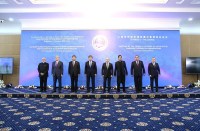Pakistan’s Prime Minister Imran Khan has addressed the Belt and Road Forum in Beijing where he spoke of the importance that Pakistan places on high level connectivity with its all-weather Chinese partner. This came after Pakistan and China signed the second phase of a free trade agreement that will allow CPEC to fulfil its purpose of enhancing prosperity from the Asia-Pacific region to south Asia with Pakistan being the chief beneficiary.
As the political leader of a country that is central to the Belt and Road initiative (BRI), Imran Khan’s voice is a crucial one for the world to hear when it comes to promoting the great potential for win-win connectivity among multilateral partners. During his remarks, the Prime Minister told his international audience about Gwadar’s humble origins as a small fishing village on the Arabian Sea. Today, Gwadar is a major and continually expanding panamax port that represents the western terminus of CPEC. As such, Gwadar’s central position in linking the Pacific to the wider Afro-Mediterranean space will help to generate sustainable wealth in Pakistan while creating new local jobs and international investment opportunities.
Imran Khan went on to encourage Belt and Road tourism opportunities as further investment in Gwadar from multiple foreign nations including China looks set to turn the former fishing village into not only a major port city but also a major spot of future tourism once local infrastructure is developed to a degree that can accommodate visitors seeking a major luxury destination in a picturesque location.
Referring to CPEC as Pakistan’s “blessing”, the Prime Minister emphasised a point made earlier by Chinese President Xi Jinping that BRI projects will help not only to create new sustainable economic opportunities for Pakistan but that Pakistan can cooperate with China on key environmental issues.
Ties between China and Pakistan have clearly been enhanced through Imran Khan’s continued attendance of the Forum in Beijing that will last into the weekend. But of equal importance is the fact that Imran Khan represents one of the world’s foremost ambassadors for Belt and Road connectivity outside of China.
In taking further steps to expand BRI on a mutilateral basis, Pakistan will be able not only to enrich its people and those of its multilateral partners, but will help to fight the western derived propaganda war against China from a clear position as a leading power in the Ummah (global Islamic community). The message of Naya Pakistan and Belt and Road is similar in that both seek to achieve social harmony and profoundly inter-connected positive relations between cultures, states and peoples based on the economic renewal that will guarantee peace through prosperity.
In this sense, Imran Khan’s considered and confident endorsement of BRI is a boost not only for the Chinese and Pakistani economies but it will help to encourage other nations to become involved in CPEC related projects. Already Saudi Arabia has invested billions into a future oil refinery in Gawdar that will help to ease Pakistan’s financial and energy woes whilst Turkey has also been formally invited by Pakistan to participate in CPEC.
The internationalisation of CPEC is a mutual goal shared by Pakistan and China. For Pakistan, the inflow of foreign direct investment at a time when the government has modernised and simplified investing apparatuses will help to decease the current account deficit left by the previous government whilst helping to fund the Islamic welfare state that Imran Khan has modelled on the profound thinking of Quaid-i-Azam Muhammad Ali Jinnah. For China, as BRI is a multilateral project, forming win-win partnerships around BRI’s flagship CPEC can help lead to further trading, investment and people centred connectivity projects that will benefit multiple nations.
Overall, Imran Khan has clearly and convincingly articulated the clear benefits that CPEC can bring to his country and Pakistan’s growing set of international partners.


